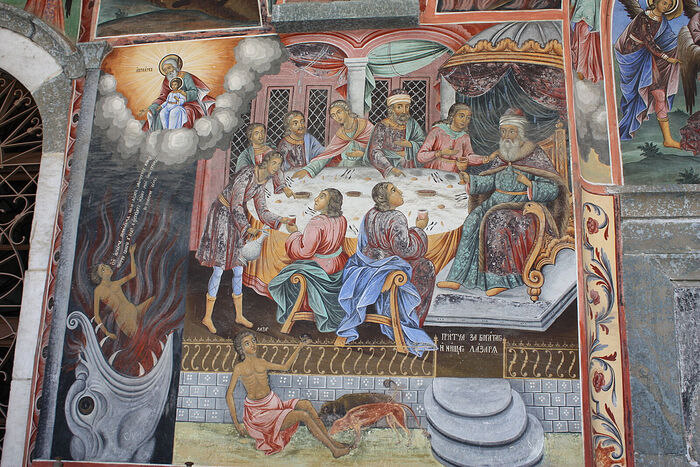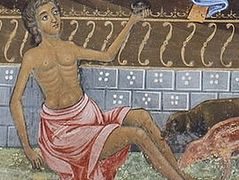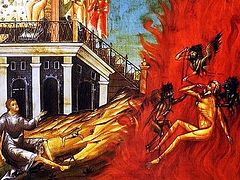 Fresco of Lazarus and the Rich Man at the Rila Monastery
Fresco of Lazarus and the Rich Man at the Rila Monastery
A common theme of St. Luke’s gospel is that God’s Kingdom reverses the usual expectations of this world. Some who are last now will be first in His Kingdom, while some who are first will be last. (Luke 13:30) Luke records the Magnificat in which the pregnant Theotokos proclaims that God “has scattered the proud in the imagination of their hearts. He has put down the mighty from their thrones, and exalted the lowly. He has filled the hungry with good things, and the rich He has sent away empty.” (Lk. 1:51-53) His gospel also includes our Lord’s “Sermon on the Plain” in which He teaches that the poor, the hungry, and those who weep and are excluded will be blessed. The Savior then warns, “But woe to you who are rich, for you have received your consolation. Woe to you who are full, for you shall hunger. Woe to you who laugh now, for you shall mourn and weep. Woe to you when all men speak well of you, for so did their fathers to the false prophets.” (Lk. 6: 20-26)
This theme of the great reversal is obvious in today’s gospel reading from Luke. The rich man provides a vivid example of someone who had all the world’s resources and lived only to satisfy himself. He used his great wealth to dress like a king and enjoy the finest food every day. He was so absorbed in gratifying his self-centered desires that he completely disregarded poor Lazarus, a miserable beggar who wanted only crumbs and whose only comfort was when stray dogs licked his open sores. The rich man surely stepped over or around Lazarus at the entrance to his home on a regular basis and never did anything to relieve his suffering.
After their deaths, the two men’s situations were reversed. The rich man had spent his life rejecting the teachings of Moses and the prophets about the necessity of showing mercy to his poor neighbors. He had diminished himself spiritually to the point that he became unable to recognize even the basic humanity of Lazarus as one who bore God’s image. Consequently, after his death he was blind to the love of God and perceived the divine glory only as a burning flame of torment. When the rich man asked Father Abraham to send Lazarus to his brothers to warn them of the consequences of living such a depraved life, the great patriarch responded, “‘If they do not hear Moses and the prophets, neither will they be convinced if someone should rise from the dead.’”
This sobering statement applies not only to those who had distorted the faith of Israel to the point that they rejected their Messiah and denied His resurrection. It applies even more to us who have the full benefit of the life of the Church. Because we have received the fullness of the mystery of God’s salvation, our responsibility is far greater than that of the Jews of old. As members of Christ’s Body, the Church, by the power of the Holy Spirit, we lack for nothing to strengthen us in seeing and serving our Lord in other people. Since every neighbor is an icon of God, how we treat them reveals our relationship to Him. Christ taught that what we do “to the least of these,” to the most wretched people, is precisely what we do to Him. (Matt. 25) If we become so obsessed with gratifying ourselves that we refuse to convey His mercy to our neighbors, then we reject our Messiah and deny His resurrection, for we do not bear witness to His victory over the corrupting power of sin and death. Regardless of what we say we believe, we will show by our actions that we have become blind to the mercy of the Lord. And like the rich man, we will separate ourselves from the joy of the Kingdom and experience the divine glory as a tormenting fire.
There is simply no way around the truth that how we relate to other people reveals whether we participate in the life our Lord. What we do and refuse to do for neighbors who need our time, attention, and generosity in any form, we do or refuse to do for Him. Our salvation is in becoming more like Christ as we find the healing of our souls through transformation by His grace. We cannot save ourselves any more than we can rise up by our own power from the grave, but we must obey His commandments in order to open our souls to receive His healing mercy and share in His fulfillment of the human person in the likeness of God.
If we do not do so, we will wander in the spiritual blindness of the rich man, regardless of how much or how little of the world’s treasures we have. We pray often for mercy before the dread judgment seat of Christ, but we must not think of mercy as a kind of legal decree. To ask for His mercy is to ask for His gracious purposes for us to be fulfilled. It is to ask that we experience His gracious divine energies for the healing of every aspect of our brokenness to the depths of our souls. The Savior provides us with opportunities to open our hearts to receive Him every day as we serve our neighbors, especially those we are inclined to overlook, disregard, fear, and condemn as our enemies for any reason. We participate more fully in the life of the Savior as we conform our character to His by sharing His mercy with others.
The rich man in the parable shaped himself decisively in unholy ways by his behavior, which reflected a deep rejection of the teachings of Moses and the prophets. In contrast, we may shape ourselves decisively in holy ways by our actions in uniting ourselves to Christ. We can never earn God’s mercy, but today’s parable reminds us that we either serve Him or our own self-centered desires. As Christ said, “Not everyone who says to Me, ‘Lord, Lord,’ shall enter the kingdom of heaven, but he who does the will of My Father in heaven.” (Matt. 7:21) The Lord’s eternal judgment will confirm whether His gracious mercy has become truly characteristic of our souls.
The Christian life is never a pursuit of the world’s glory and praise, whether that is for wealth, power, virtue, or religiosity. St. Paul knew that the path to the Kingdom runs not through exalting ourselves, but by humbly accepting whatever struggles we encounter in serving Christ. He did not boast about his mystical experiences, but highlighted his “thorn in the flesh” through which he learned to trust in the grace of God, Whose strength is perfected in our weakness. It is certainly possible to corrupt the Christian faith into a way of glorifying ourselves, whether in our own eyes or those of others. Nations, cultures, and partisan groups have often tried to domesticate our Lord’s Kingdom according to their preferred agendas. In doing so, they tempt us to boast about the usefulness of the faith in achieving earthly goals that simply perpetuate the usual ways of the world in one form or another. They do not seek the true humility of boasting only in our weakness and dependence on the mercy of the Lord, but replace the great reversal of His reign with whatever will help them become first in this world.
Our hope to enter into the Kingdom that subverts the expectations of this world is in the mercy of the Lord Who is present to us in all our neighbors, especially those we find it hardest to love. How we treat them reveals the true state of our souls and whether we are gaining the spiritual clarity to behold the glory of the Lord with joy or to experience only the tormenting fire of bitter regret. Let us open ourselves to receive His mercy as we act mercifully toward the poor Lazaruses of our lives.



